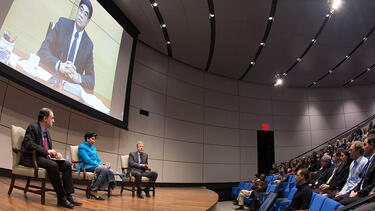Leadership
The Lessons from Pope Francis for the Class of 2025
Yale SOM leadership expert Jeffrey Sonnenfeld reflects on what the next generation of leaders can learn from the late pope.

Does New York City Need Lincoln Center?
Performing arts organizations are contending with aging audiences and shrinking budgets, and looking for new ways to reach audiences. Yale Insights spoke with Jed Bernstein ’79, formerly a theatrical producer, as he prepared to begin his new job as president of Lincoln Center, the country’s biggest stage for classical music, opera, and dance and a pillar of New York City’s economy.

How Do You Market a TV Phenomenon?
Starting in the late 1990s, a series of television shows with a novelistic sweep, many of them produced by cable channels, have redefined the medium; at the same time, technology has given audience members new ways to engage with each other and their favorite shows. As AMC’s executive vice president of marketing, Linda Schupack '92 has had the job of selling two of the biggest hits of TV’s second golden age: Mad Men and Breaking Bad. She talked to Yale Insights about creating great marketing for great stories.
What's the Role of Relationships in Business?
Business is a social act. The relationships among a network of stakeholders define an organization and account for a great deal of the success or failure of a global brand. John Pepper discusses how personal relationships and organizational ties defined a career that included serving as CEO and chairman of P&G and chair of Disney’s board of directors.

Women as Bosses Still Face Bias
In a New York Times op-ed, Professors Victoria Brescoll and Jeffrey Sonnenfeld write about the gender bias and discrimination that persist for powerful women in corporate America.
A Scientific Approach to Increasing Diversity in the Sciences
To reduce subtle biases that limit women and minority academic scientists, research universities should design diversity programs that adhere to rigorous scientific standards, according to a new paper co-authored by Professor Victoria Brescoll.
Are CEOs Brands?
If you hear the names “Steve Jobs,” “Jamie Dimon,” and “Warren Buffett,” you’ll probably think “Apple,” “JPMorgan Chase,” and “Berkshire Hathaway.” A CEO’s image can become almost inseparable from the company he or she leads.

Can Teaching Tea Workers In India To Read Have a Larger Impact?
Mercy Corps’ literacy program in Assam, India, works because it is local—designed and taught by staff with an understanding of the culture there. As a global organization, Mercy Corps needs to balance investment in a deep understanding of local issues with the imperative to make a difference in as many lives as possible.

How do you run a large school district?
The newly appointed superintendent of New Haven Public Schools talked with Yale Insights about what kind of leadership is needed in education.
Want to Fix Social Security? Use the Right Wrench
In a New York Times op-ed, Professor Robert Shiller writes that President Obama’s proposal to change how inflation is measured in Social Security benefit calculations “…solves the wrong problem, and, in doing so, undermines the integrity of the Social Security system.” One alternative, suggests Shiller, is to link retirees’ benefits to GDP per capita, in current dollars, which would align the interests of the retired with those of society as a whole.
How do you set strategy for a global enterprise?
Long-term thinking often gets lost in solving short-term problems, but the most successful companies make corporate strategy a top priority.
